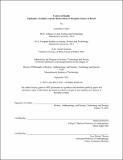Vectors of Health: Epidemics, Ecologies, and the Reinvention of Mosquito Science in Brazil
Author(s)
Castro, Luisa Reis
DownloadThesis PDF (2.638Mb)
Advisor
Helmreich, Stefan
Terms of use
Metadata
Show full item recordAbstract
The Aedes aegypti mosquito can be a disease vector, transmitting pathogenic viruses that are harmful to human health, such as Zika, dengue, chikungunya, and yellow fever. Since the early 20th century, this insect has been the focus of scientific research and public health campaigns, framed as a conveyor of death and targeted as a winged enemy to be destroyed. This species continues to be a serious concern; in Brazil, the A. aegypti is a persistent presence in urban landscapes, with disease outbreaks an almost expected public health issue.
This dissertation ethnographically investigates three groups proposing novel solutions to manage this multispecies interaction. All three projects aimed to instrumentalize the A. aegypti, harnessing the insect in the very efforts to address the viruses it can transmit. The proponents of these projects argued that their strategies worked with these insects. In Rio de Janeiro, a group infected the A. aegypti with a bacterium called Wolbachia, a microbe that can inhibit viral transmission. In Recife, a group sterilized male mosquitoes through irradiation, releasing these insects to mate with wild ones on the island of Fernando de Noronha and prevent future A. aegypti generations. The third group, in Foz do Iguaçu, made use of the mosquitoes’ need for blood to mature eggs and preference for biting humans in order to entrap these insects; captured mosquitoes were then transformed into sentinels, mapping the insect’s presence, distribution, and status as a vector.
Here, I show that in these bio-technoscientific projects the goal was not simply to transform the A. aegypti from a vector of pathogenic viruses into a vector of health that could embody the solution to mosquito- borne diseases. I also argue that my interlocutors themselves aimed to become vectors of health who inverted the usual direction of knowledge production, globally, nationally, and administratively. In this case, these mosquito projects were expected to give the science produced from their particular positionality (Global South; Northeast of Brazil; and a public health center) deserved recognition, even amid austerity measures and budget cuts that threaten research and health policies. In addition, I demonstrate that these projects are situated within Brazil’s long history of instrumentalizing mosquitoes to make scientific and political claims.
Overall, my research shows that national ideologies of belonging are intertwined with modes of knowledge and power that shape relations between humans, and between humans, mosquitoes, and microbes. What, I ask, are the different geopolitics of knowledge production and health practices that drive efforts to address mosquito-borne diseases? What kinds of multispecies arrangements emerge in these racialized, political ecologies? How are the histories and imaginaries of Brazilian science reinscribed or transformed through these initiatives?
Based on two years of multi-sited ethnographic research as well as qualitative interviews, document analysis, and archival research, this dissertation shows that mosquitoes are not only historical, social actors that can reconfigure politics and the production of knowledge, but that the A. aegypti species in particular has come to embody both the legacies and possibilities of Brazilian science. And by thinking with, and alongside, my interlocutors, historical actors, and even the A. aegypti species itself, I reveal the politics and possibilities of pursuing scientific research and public health interventions in Brazil.
Date issued
2021-09Department
Massachusetts Institute of Technology. Program in Science, Technology and SocietyPublisher
Massachusetts Institute of Technology